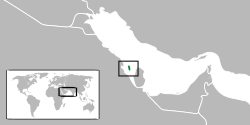State of Bahrain دولة البحرين Dawlat al-Baḥrayn | |||||||||
|---|---|---|---|---|---|---|---|---|---|
| 1971–2002 | |||||||||
| Anthem: نشيد البحرين الوطني Baḥraynunā Our Bahrain | |||||||||
 Location of Bahrain | |||||||||
| Capital | Manama | ||||||||
| Common languages | Arabic | ||||||||
| Religion | Islam (official religion)[1] | ||||||||
| Government | Unitary absolute monarchy | ||||||||
| Emir | |||||||||
• 1971–1999 | Isa ibn Salman Al Khalifa | ||||||||
• 1999–2002 | Hamad ibn Isa Al Khalifa | ||||||||
| Prime Minister | |||||||||
• 1971–2002 | Khalifa bin Salman Al Khalifa | ||||||||
| Legislature | None (rule by decree) (until 1973 and after 1975) National Assembly (in 1973–1975) | ||||||||
| History | |||||||||
• Independence from the United Kingdom | 15 August 1971 | ||||||||
• Elevated to Kingdom | 14 February 2002 | ||||||||
| Population | |||||||||
• 1971 | 216,078[2] | ||||||||
• 2001 | 650,604 | ||||||||
| Currency | Bahraini dinar | ||||||||
| ISO 3166 code | BH | ||||||||
| |||||||||
| Today part of | Bahrain | ||||||||
The State of Bahrain (Arabic: دولة البحرين Dawlat al-Baḥrayn) was the name of Bahrain from 1971 to 2002. On 15 August 1971, Bahrain declared independence and signed a new treaty of friendship with the United Kingdom. Bahrain joined the United Nations and the Arab League later in the year.[3] The oil boom of the 1970s benefited Bahrain greatly, although the subsequent downturn hurt the economy. The country had already begun diversification of its economy and benefited further from Lebanese Civil War in the 1970s and 1980s, when Bahrain replaced Beirut as the Middle East's financial hub after Lebanon's large banking sector was driven out of the country by the war.[4]
Following the 1979 Islamic revolution in Iran, in 1981 Bahraini Shī'a fundamentalists orchestrated a failed coup attempt under the auspices of a front organisation, the Islamic Front for the Liberation of Bahrain. The coup would have installed a Shī'a cleric exiled in Iran, Hujjatu l-Islām Hādī al-Mudarrisī, as supreme leader heading a theocratic government.[5] In December 1994, a group of youths threw stones at female runners during an international marathon for running bare-legged. The resulting clash with police soon grew into civil unrest.[6][7]
A popular uprising occurred between 1994 and 2000 in which leftists, liberals and Islamists joined forces.[8] The event resulted in approximately forty deaths and ended after Hamad ibn Isa Al Khalifa became the Emir of Bahrain in 1999.[9] A referendum on 14–15 February 2001 massively supported the National Action Charter.[10] He instituted elections for parliament, gave women the right to vote, and released all political prisoners. As part of the adoption of the National Action Charter on 14 February 2002, Bahrain changed its formal name from the State (dawla) of Bahrain to the Kingdom of Bahrain.[11]
- ^ http://en.wikisource.orgview_html.php?sq=Albert Einstein&lang=en&q=Constitution_of_the_State_of_Bahrain_(1973) Constitution_of_the_State_of_Bahrain_(1973)
- ^ "Archived copy" (PDF). Archived from the original (PDF) on 28 January 2015. Retrieved 20 June 2013.
{{cite web}}: CS1 maint: archived copy as title (link) - ^ The Middle East and North Africa 2004. Routledge. 2003. p. 225. ISBN 1-85743-184-7.
- ^ "Bahrain". National Post. Archived from the original on 4 September 2012. Retrieved 5 October 2012.
- ^ Talbott, Strobe (25 October 1982). "Gulf States: Stay Just on the Horizon, Please". Time. Archived from the original on 3 October 2012. Retrieved 2 October 2012.
- ^ Darwish, Adel (1 March 1999), "Bahrain remains stable despite arson attacks that took place in the country", The Middle East
- ^ "The Rich/Poor & Sunni/Shiite Rift". APS Diplomat. 18 March 2002. Archived from the original on 17 January 2013. Retrieved 5 October 2012.
- ^ Darwish, Adel (March 1999). "Rebellion in Bahrain". Middle East Review of International Affairs. 3 (1). Archived from the original on 14 April 2012. Retrieved 2 October 2012.
- ^ Malik, Adnan (14 December 2002). "Bahrain's monarch opens parliament after a span of nearly 30 years". Associated Press. Archived from the original on 17 January 2013.
- ^ "Country Theme: Elections: Bahrain". UNDP-Programme on Governance in the Arab Region. 2011. Archived from the original on 10 May 2011. Retrieved 9 February 2011.
- ^ "The Kingdom of Bahrain: The Constitutional Changes". The Estimate: Political and Security Analysis of the Islamic World and its Neighbors. 22 February 2002. Retrieved 17 February 2011.


